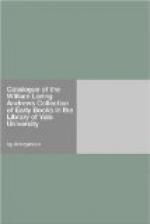20. PIUS II. (AENEAS SILVIUS PICCOLOMINI).
De curialium miseria. [Paris,
Michael Friburger, Ulric Gering
and Martin Crantz, 1472.]
Fol. 1^a: Aeneae Siluii poaetae laureati (cui et pro pontificali dignitate Pio nomen est) in disputatione_m_ de curialiu_m_ miseria ad perspicacissimu_m_ iurisconsultu_m_ Iohanne_m_ Ech, serenissimi diuiq_ue_ principis, Alberti, caesaris inuictissimi! Alberti quoque austriae ducies inclyti consiliariu_m_ atq_ue_ oratore_m_ praefacio f[oe]liciter incipit; Fol. 34^a: Vale uir (nisi ex curialibus unus esses) meo iudicio prudens; COLOPHON: Aeneae Siluii de curialiu_m_ miseria disputatio finem habet f[oe]licem; Fol. 35, 36, blank.
Quarto. Quires [1-3^{10}, 4^6], 36 leaves, the last two blank, 23 lines to the page, roman letter, without signatures, catchwords, pagination, place, printer’s name or date. Two- and six-line spaces left for capitals. Claudin XX. Pellechet 132. Hain 198.
First initial rubricated in the same style and by the same hand as in the De duobus amantibus. Other capitals and paragraph-marks in red and blue alternately. Initial-strokes in yellow. At the bottom of fol. 29^a a line accidentally dropped by the compositor is supplied in manuscript by a contemporary hand, viz., “non te uolunt. Quida_m_ uero pote_n_tes sunt! ac ex.” Both the recto and the verso of the leaf have the full complement of 23 lines but there is a hiatus in the text. The copies in the Bibliotheque Nationale, and the Bibliotheque Mazarine, Paris, have the line supplied in manuscript in like manner, but instead of uero read non, which does not suit the context.
According to Claudin this is the twentieth book printed at the Sorbonne press. To the five copies known to him this adds a sixth.
Bound with No. 19. De duobus amantibus.
21. PLATO. Epistolae. [Paris, Michael Friburger,
Ulric Gering and Martin
Crantz, 1472.]
Fol. 1^a: Ad prudentem et magnificum uirum Cosma_m_ de medicis florentinu_m_, Leonardi Aretini clarissimi oratoris, in ep_isto_las plato_n_is quas ex graecis latinas fecit! p_rae_fatio; Fol. 52^a, COLOPHON: FINIS.
Discite rectores diuinitus,
ore platonis!
Quid uos, q_ui_d ciues reddat
in urbe bonos;
Quarto. Quires [1-4^{10}, 5^8, 6^2, 7^2], 52 leaves, 23 lines to the page, roman letter, without signatures, catchwords, pagination, place, printer’s name or date. Three- to five-line spaces left for capitals. The first initial supplied in blue and red, other capitals in blue and red alternately. Initial strokes in yellow. Claudia XIV. Philippe VII. Crevenna 1523. Hain 13066.
Leonardo Bruni, often called Leonardo Aretini from his birthplace Arezzo, translated five of the dialogues of Plato in addition to the letters.




